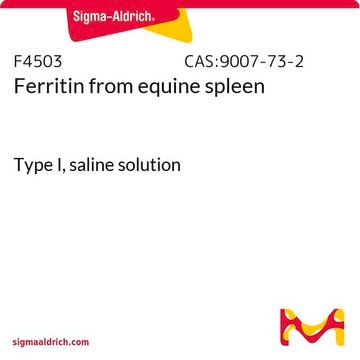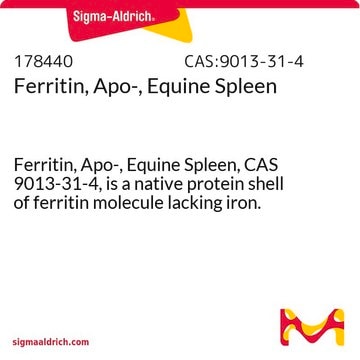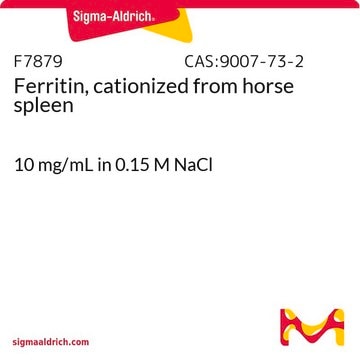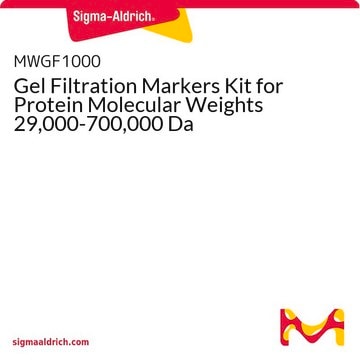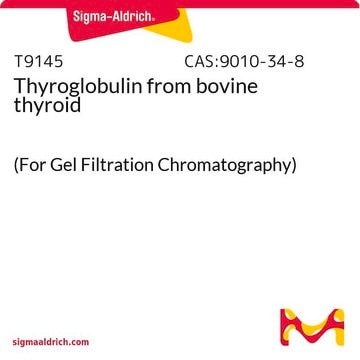Recommended Products
Quality Level
sterility
0.2 μm filtered
form
liquid
mol wt
major subunit ML 19,889
minor subunit MH 22,200
native ~481.2 kDa (24 subunits, approx. 20 kDa each)
color
clear to slightly hazy, solution
storage temp.
2-8°C
Looking for similar products? Visit Product Comparison Guide
Application
Apoferritin from equine spleen has been used:
- to determine its partition coefficients in phase systems
- in NaCl for iron loading of cultured cells
- in in situ liquid scanning transmission electron microscope for imaging the interface of biology and nanotechnology
Biochem/physiol Actions
This protein shell of ferritin lacking iron is widely used for the calibration of gel filtration columns and sodium dodecyl sulfate (SDS)-polyacrylamide gel electrophoresis. It is very abundant in beta-cells of the pancreas where it acts as an anti-oxidant. When added to cultured endothelial cells apoferritin is taken up in a dose-responsive manner and appears to protect the cells from oxidant-mediated cytolysis.
Physical form
Solution in 0.135 M sodium chloride.
Storage Class Code
10 - Combustible liquids
WGK
WGK 3
Flash Point(F)
Not applicable
Flash Point(C)
Not applicable
Personal Protective Equipment
dust mask type N95 (US), Eyeshields, Gloves
Choose from one of the most recent versions:
Certificates of Analysis (COA)
Lot/Batch Number
Don't see the Right Version?
If you require a particular version, you can look up a specific certificate by the Lot or Batch number.
Already Own This Product?
Find documentation for the products that you have recently purchased in the Document Library.
Customers Also Viewed
Masahide Takehara et al.
Analytical biochemistry, 373(2), 322-329 (2007-12-07)
Two kinds of layer silicate powder, Micromica and chlorite, were used to aid protein crystallization by the addition to hanging drops. Using appropriate crystallization buffers, Micromica powder facilitated crystal growth speed for most proteins tested in this study. Furthermore, the
G Balla et al.
The Journal of biological chemistry, 267(25), 18148-18153 (1992-09-05)
Phagocyte-mediated oxidant damage to vascular endothelium is likely involved in various vasculopathies including atherosclerosis and pulmonary leak syndromes such as adult respiratory distress syndrome. We have shown that heme, a hydrophobic iron chelate, is rapidly incorporated into endothelial cells where
Hamish G Brown et al.
Communications biology, 5(1), 817-817 (2022-08-15)
Ice thickness is arguably one of the most important factors limiting the resolution of protein structures determined by cryo-electron microscopy (cryo-EM). The amorphous atomic structure of the ice that stabilizes and protects biological samples in cryo-EM grids also imprints some
Jorge H Melillo et al.
Scientific reports, 12(1), 16512-16512 (2022-10-04)
Some of the best nucleating agents in nature are ice-nucleating proteins, which boost ice growth better than any other material. They can induce immersion freezing of supercooled water only a few degrees below 0 °C. An open question is whether this
Circularly polarized luminescent CdS quantum dots prepared in a protein nanocage.
Masanobu Naito et al.
Angewandte Chemie (International ed. in English), 49(39), 7006-7009 (2010-08-27)
Our team of scientists has experience in all areas of research including Life Science, Material Science, Chemical Synthesis, Chromatography, Analytical and many others.
Contact Technical Service